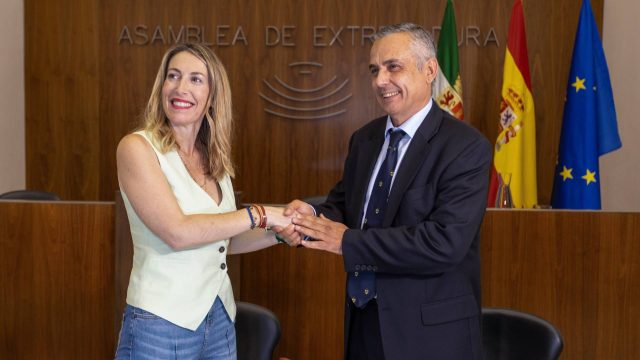
After nail-biting negotiations, the conservative majority in Spain’s Extremadura region reached an agreement to form a right-wing government. This will be the fourth agreement between the EPP’s Popular Party (PP) and ECR’s Vox, in what has been a gradual but resolved takeover of the country’s regional and local governments from socialist dominance. Today, Vox either governs with or has facilitated conservative governments in the regions of Castilla-La Mancha, Andalucía, the Balearic Community, the Valencian Community, and now Extremadura.
To say negotiations in Extremadura were tense would be a monumental understatement. María Guardiola, the PP’s leader in Extremadura switched its position about negotiating and/or governing with Vox at least three times since the May 28 regional elections. Within 48 hours, Guardiola said she wanted “an understanding” with Vox. However, when Vox later requested to be part of the government, Guardiola offered them just the presidency of the Parliament. Vox denied this request as it would have been “disrespectful” to its voters “to give away their votes for free”.
Then, in an unforeseen twist, Guardiola accused Vox conservatives of denying the wave of violence against women, of promoting violence against the LGBTQ population, and “dehumanizing” migrants. Negotiations stalled at that moment. So much for “understanding”.
The PP headquarters in Madrid, like Guardiola, were also sending mixed and unclear signals. The president of the (national) PP, Alberto Núñez Feijóo has adopted a confusing position, wanting to distance himself from the conservative values of Vox, and appearing to be ever closer to the Spanish Socialist Party (PSOE), which he also disparages in his public discourse. Feijóo even insisted on the idea that the party with the most votes (PSOE, in the case of Extremadura) should be the one to lead the regional governments, when both the PP and the PSOE had the same number of seats in the regional parliament. His whole logic also denies the parliamentary nature of the system, where majority-building prevails over the most voted party, thereby ensuring the maximum possible representation.
Eventually, Guardiola sat back at the negotiating table. Just a few days ago, one newspaper revealed from trusted sources that Feijóo, and Vox’s leader Santiago Abascal, did intervene to unblock the situation and sent teams from each of their national offices with clear lines of negotiation. The moved worked. As promised, Vox lent its hand and managed to alter the political landscape in a region too long dominated by socialist policies. Vox will be part of the new government in the regional ministry of “Forest Management and Rural World”. Ángel Pelayo, the leader of Vox in Extremadura celebrated this milestone: “Changed has arrived in Extremadura. We will change Extremadura, and we will change it for the better”.
A couple of lessons can be drawn from the Extremadura saga. National parties still have a say in the political business of regional parties. That national leadership, and the legitimacy that is attached to it, is key in resolving disputes that jeopardize fostering alternatives to left-wing populisms. Also, Vox has demonstrated it must, can, and will lay out conditions to facilitate governments.
Finally, the only sensible and real alternative to socialist governments in the regions (and in the country) can only come with the joint strengths of the PP and Vox. Guardiola’s first insight was right all along. The two parties MUST understand each other and work together to counter the policies of the PSOE and the new brands of left-wing politics that are starting to make gains in Spain. The PP, which almost certainly will win the General Election on July 23 but will need the support of Vox to get to the government, ought to remember the lessons of Extremadura. Respect for Vox voters is a precondition to any negotiation.



 Subscribe
Subscribe